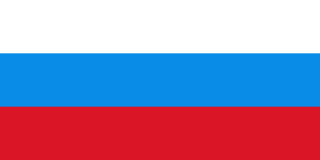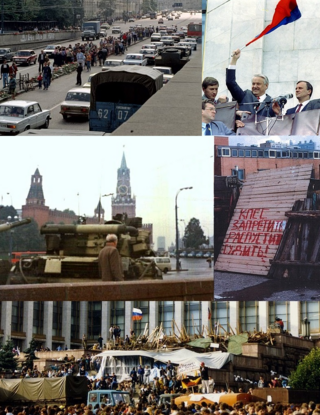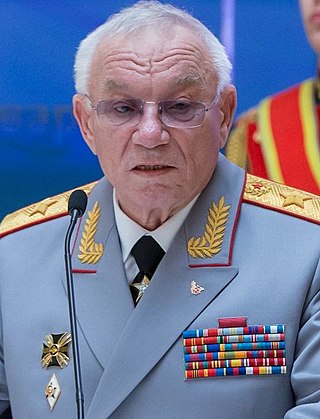Related Research Articles

The modern history of Russia began with the Russian Republic of the Soviet Union gaining more political and economical autonomy amidst the imminent dissolution of the USSR during 1990–1991, proclaiming its sovereignty inside the Union in June 1990, and electing its first President Boris Yeltsin a year later. The Russian SFSR was the largest republic of the Soviet Union, but it had no significant independence before, being the only Soviet republic to not have its own branch of the Communist Party.

Krasnoyarsk is the largest city and administrative center of Krasnoyarsk Krai, Russia. It is situated along the Yenisey River, and is the second-largest city in Siberia after Novosibirsk, with a population of over 1.1 million. Krasnoyarsk is an important junction of the renowned Trans-Siberian Railway, and is one of the largest producers of aluminium in the country.

Krasnoyarsk Krai is a federal subject of Russia located in Siberia. Its administrative center is the city of Krasnoyarsk, the third-largest city in Siberia, after Novosibirsk and Omsk. Comprising half of the Siberian Federal District, Krasnoyarsk Krai is the largest krai in Russia, the second-largest federal subject in the country after neighboring Sakha, and the third-largest country subdivision by area in the world. The krai covers an area of 2,339,700 square kilometers (903,400 sq mi), constituting roughly 13% of Russia's total area. Krasnoyarsk Krai has a population of 2,828,187 as of the 2010 Census.

Lieutenant General Alexander Ivanovich Lebed was a Soviet and Russian military officer and politician who held senior positions in the Airborne Troops before running for president in the 1996 Russian presidential election. He did not win, but placed third behind incumbent Boris Yeltsin and the Communist Party leader Gennady Zyuganov, with roughly 14% of the vote nation-wide. Lebed later served as the Secretary of the Security Council in the Yeltsin administration, and eventually became the governor of Krasnoyarsk Krai, the second largest Russian region. He served four years in the latter position, until his death following a Mi-8 helicopter crash.

The 1991 Soviet coup d'état attempt, also known as the August Coup, was a failed attempt by hardliners of the Soviet Union's Communist Party to forcibly seize control of the country from Mikhail Gorbachev, who was Soviet President and General Secretary of the Communist Party at the time. The coup leaders consisted of top military and civilian officials, including Vice President Gennady Yanayev, who together formed the State Committee on the State of Emergency (GKChP). They opposed Gorbachev's reform program, were angry at the loss of control over Eastern European states and fearful of the USSR's New Union Treaty which was on the verge of being signed. The treaty was to decentralize much of the central Soviet government's power and distribute it among its fifteen republics.

Oleg Vladimirovich Deripaska is a Russian billionaire and an industrialist. Deripaska enriched himself on previously state-owned assets that were privatized in the aftermath of the collapse of the Soviet Union. He is the founder of Basic Element, one of Russia's largest industrial groups, and Volnoe Delo, Russia's largest charitable foundation. He was the president of En+ Group, a Russian energy company, and headed United Company Rusal, the second-largest aluminum company in the world, until he quit both roles in 2018.

Galina Vasilyevna Starovoitova was a Soviet dissident, Russian politician and ethnographer known for her work to protect ethnic minorities and promote democratic reforms in Russia. She was shot to death in her apartment building in 1998.
David Reuben and Simon Reuben are Indian-born British businessmen. In May 2020, they were named as the second richest family in the UK by the Sunday Times Rich List with a net worth of £16 billion.

Michael Cherney is an Uzbek-born Israeli entrepreneur and industrialist. He is known for his significant role in the 1990s aluminium industry in Russia, and his business ventures in Israel. He is also the founder of the Michael Cherney Foundation and a sponsor of The Intelligence Summit.

United Company RUSAL, international public joint-stock company is the world's second largest aluminium company by primary production output. It was the largest until overtaken by China Hongqiao Group in 2015. UC RUSAL accounts for almost 9% of the world's primary aluminium output and 9% of the world's alumina production.

En+ Group plc is a green energy and metals company. It has a controlling stake in Rusal, one of the world's largest aluminum producers outside of China. EN+ was founded by Oleg Deripaska

Anatoly Sergeyevich Kulikov is a Russian General of the Army, former Interior Minister of Russia (1995–1998).
Oleg Nikolayevich Soskovets is a Soviet, Kazakh and Russian politician.

On 30 September 1994, Boris Yeltsin, then President of the Russian Federation, was scheduled for an official state visit to Ireland but failed to get off his plane when it landed at Shannon Airport. The incident embarrassed the Irish government, in particular Taoiseach Albert Reynolds who was left standing at the foot of the stairs to Yeltsin's plane, and raised questions about Yeltsin's health and fitness to serve.

The Soskovets campaign strategy refers to the strategy devised by Oleg Soskovets for Boris Yeltsin's 1996 reelection campaign for the Presidency of Russia. This strategy served as the initial template for Yeltsin's campaign before being discarded by March 1996.

Beginning in 1995, Boris Yeltsin's government began privatizing state-owned shares in companies through a loans for shares scheme. The scheme helped with "fundraising" for Yeltsin's 1996 reelection campaign and restructuring freshly-sold companies at the same time.
Vladimir Vasilyevich Kadannikov was a Russian businessman and politician who served as a Deputy Prime Minister of Russia (1996) in charge of economic policy, briefly replacing Anatoly Chubais, under President Boris Yeltsin.

The Boris Yeltsin presidential campaign, 1996 was the reelection campaign of Russian President Boris Yeltsin in the 1996 election.

The Xerox affair was a Russian political controversy that took place during the second round of the 1996 Russian presidential election. The controversy stems from the June 19 detention of two staffers of President Boris Yeltsin's reelection campaign outside of the Russian White House. Security agents discovered $500,000 in a Xerox copy-paper box that was being carried by one of the men. It was soon discovered that the staffers had been arrested and interrogated at the behest of Mikhail Barsukov and Alexander Korzhakov, both of whom were members of Yeltsin's campaign organization and presidential administration.
Queen Elizabeth II of the United Kingdom of Great Britain and Northern Ireland, her husband Prince Philip, Duke of Edinburgh and Foreign Secretary Douglas Hurd made a state visit to Russia from 17 to 20 October 1994, hosted by the President of Russia, Boris Yeltsin. It was the first and only visit by a reigning British monarch on Russian soil.
References
- 1 2 3 Klebnikov, Paul (26 November 2001). "Gangster-free capitalism". Forbes. Archived from the original on 2004-09-19. Retrieved 8 October 2018.
- 1 2 3 4 5 Adachi, Yuko (2013). Building Big Business in Russia: The Impact of Informal Corporate Governance Practices. Routledge. p. 67. ISBN 9781135147129. Archived from the original on 2018-10-10. Retrieved 2018-10-09.
- 1 2 3 4 5 "Capitalism In A Cold Climate". Fortune Magazine. 12 June 2000. Archived from the original on 2014-10-19. Retrieved 8 October 2018.
- 1 2 3 4 5 6 7 8 9 Banerjee, Neela (28 January 1997). "Amid Privatization, Controversy: Metals Firm Scores inRussia". WSJ. Archived from the original on 9 October 2018. Retrieved 8 October 2018.
- ↑ Mobius, Mark (2012). Passport to Profits: Why the Next Investment Windfalls Will be Found Abroad and How to Grab Your Share. John Wiley & Sons. p. 148. ISBN 9781118153840. Archived from the original on 2018-10-10. Retrieved 2018-10-09.
- 1 2 "Glory Days Fading for Trans-World". The Moscow Times. 11 February 1998. Archived from the original on 9 October 2018. Retrieved 9 October 2018.
- 1 2 Latynina, Yulia (14 November 2001). "Parachute Accident Marks End of an Era". The Moscow Times. Archived from the original on 2 February 2019. Retrieved 8 October 2018.
- ↑ Tavernise, Sabrina (20 June 2002). "A Russian Aluminum Mobster, Set Free, Gains Teflon Status". New York Times. Archived from the original on 2018-01-29. Retrieved 9 October 2018.
- ↑ "Yeltsin fires key security officials". CNN.com. 20 June 1996. Archived from the original on 2005-04-29. Retrieved 9 October 2018.
- ↑ "Siberia's great smelting pot". The Guardian. 18 February 2001. Archived from the original on 2018-07-05. Retrieved 2018-10-09.
- 1 2 Barker, Alex (2008-10-21). "Osborne on the Oligarchs". Financial Times. Archived from the original on 2022-08-24. Retrieved 24 August 2022.